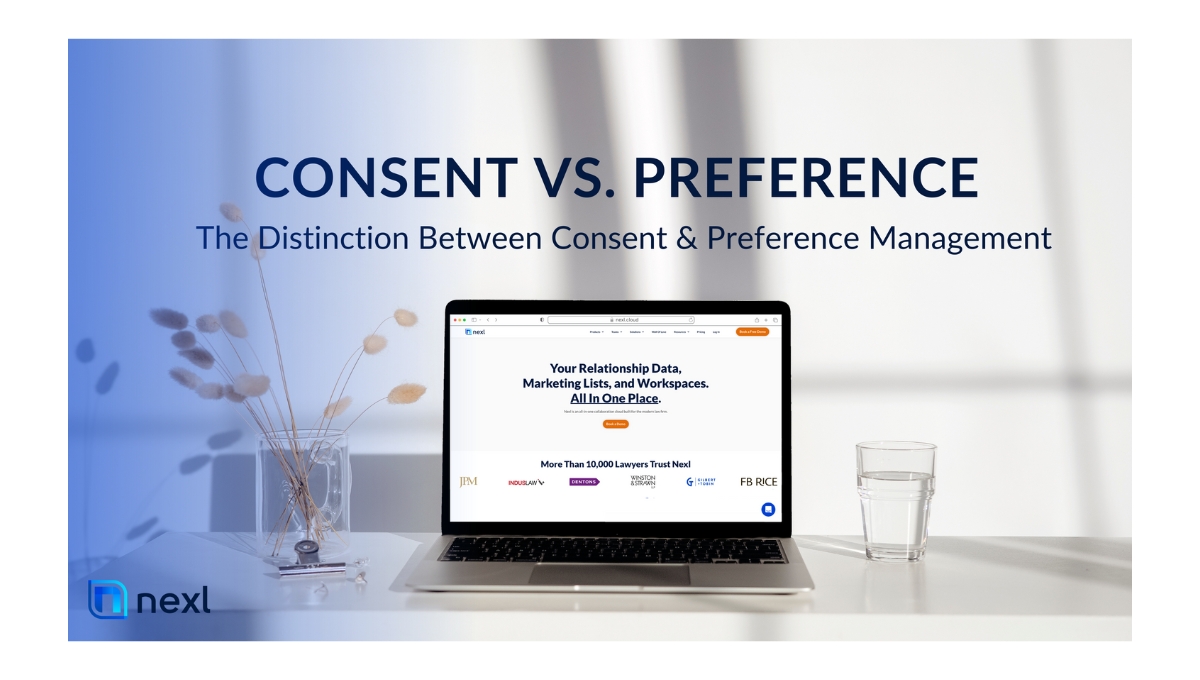Email marketing for law firms can be compared to a jigsaw-like puzzle. It’s complex and takes time to master, however, the reward is incomprehensible.
The main challenge of email marketing lies in connecting effectively with the right audience, at the right time. This blog explores two crucial pieces needed to master this puzzle: consent management and preference management. We’ll break down what these terms mean and how they differ. We’ll journey through the world of gaining consent and creating content that matches recipients’ interests. By understanding the distinctions between these two, we’ll explore how to send the right messages to the right people, while also following the rules and building trust. Join us as we dive into the world of consent and preference management, revealing their power in email marketing.
1 – What is consent management?
2 – What is preference management?
3 – The differences between consent and preference management
The Foundation of Consent Management – What is Consent Management?
In the world of email marketing for legal professionals, gaining and managing consent is the foundation of trust and compliance. As legal marketers, it’s essential to grasp the fundamentals of consent management to ensure your email campaigns not only reach the right audience but also follow the rules.
A) Understanding Consent in Email Marketing
Consent, in the context of email marketing, is all about permission. It refers to the process of obtaining and managing permission from subscribers to receive marketing emails. Essentially, it’s the explicit agreement given by individuals to receive communications from your law firm. This permission-based approach is not just a best practice; it’s often a legal requirement in many jurisdictions. Under GDPR guidelines, email marketing requires obtaining consent that is freely given, specific, informed, and unambiguous. This means that individuals must opt-in through written consent, clicking a checkbox on a form, or confirming through double opt-in.
Understanding what consent means and how to obtain it is the first step in the journey of consent management.
- Why It Matters: For law firms, gaining consent in email marketing goes beyond a legal obligation. It signifies a commitment to respecting audience preferences and building trust. When recipients willingly opt-in to receive emails, they are more likely to engage with the content, leading to higher open rates and better engagement. In essence, it’s not just about legality; it’s a strategic choice for more effective and ethical email marketing.
Consider Michelle the legal marketer. She learned this lesson about gaining consent in email marketing. Michelle tested two campaigns. In the first, she sent emails without consent, resulting in low open rates and minimal engagement. In the second, where she obtained consent, open rates were higher, and recipients were more engaged.
The lesson Michelle learned? Gaining consent isn’t just a legal checkbox; it’s a strategic choice. It builds trust, encourages engagement, and fosters meaningful connections with the audience.
- Types of Consent: Understanding the two types of consent is vital for law firms. Explicit consent, where recipients willingly agree to receive emails, is ideal. Implied consent, in situations with existing business relationships, may be acceptable. Using the right type of consent is crucial to complying with the law while respecting recipient preferences and maintaining positive client relationships.
Explicit Consent: When individuals actively and clearly agree to receive emails from a law firm. It is unambiguous and requires a specific action or statement indicating the recipient’s willingness to receive such emails.
Example: Imagine a potential client visiting a law firm’s website. On the website, there’s a subscription form clearly stating, “Subscribe to our newsletter for legal updates and insights.” The potential client fills out the form, providing their email address and clicking a button that says, “Subscribe.” This action signifies explicit consent because the individual has actively agreed to receive emails from the law firm.
Implied Consent: A form of consent that arises in specific situations where there is an existing business relationship between the law firm and the recipient. It implies that because of this prior relationship, the recipient may reasonably expect to receive emails related to that relationship.
Example: Consider a law firm that has an ongoing legal representation relationship with a client. As part of this relationship, the law firm periodically sends case updates and relevant legal information via email. In this context, the client may have implied consent to receive such emails because they are related to the existing business relationship between the client and the law firm.
- Transparency and Clarity: For law firms, being transparent and clear in their email marketing is crucial. This means clearly explaining the type and frequency of emails recipients will receive and how they can easily unsubscribe at any time. This approach ensures compliance with the law and builds trust with recipients, which is vital in the legal profession.
This includes:
- Explaining Email Content: Law firms should clearly communicate what kind of emails recipients will receive. Whether it’s legal updates, newsletters, or other content. Being explicit ensures that recipients know what to expect.
- Frequency: Recipients should know how often they can expect to receive emails. Whether it’s weekly, monthly, or for specific events. Setting these expectations helps manage recipients’ anticipations.
- Opt-Out Information: Law firms should make it clear how recipients can easily unsubscribe from the emails if they choose to do so. Providing clear opt-out instructions ensures that recipients have control over their email subscriptions.
B) Consent Management Tools and Best Practices
Effective consent management involves using tools and practices that facilitate the collection, storage, and documentation of consent. As a legal marketer, you need to ensure that your email marketing efforts comply with various data protection regulations, such as GDPR in Europe or CAN-SPAM in the United States.
Compliance requirements for law firms in consent management include:
- Legal Regulations: Law firms must adhere to national and regional data protection regulations, such as GDPR in Europe or CAN-SPAM in the United States.
GDPR (General Data Protection Regulation): This regulation applies to all emails directed to or sent from countries that are part of the European Union. Under GDPR, consent must be explicit, not implied. Businesses must obtain freely given, specific, informed, and unambiguous consent from individuals to process their data for advertising and marketing purposes. GDPR also requires organizations to provide an option to opt-out in every subsequent marketing email to the individual.
CAN-SPAM (Controlling the Assault of Non-Solicited Pornography And Marketing Act): This US-based law was enacted in 2003 and applies to businesses sending emails to recipients in the US, regardless of where the company is situated. Unlike GDPR, CAN-SPAM doesn’t focus on personal data protection directly but instead on the impact of unsolicited emails in individuals’ inboxes. CAN-SPAM requires businesses to follow strict requirements, such as not using deceiving or misleading information in email headers or subject lines, offering an easy way to opt out of the mailing list, and honoring those decisions within ten days, among others.
- Forms: Utilizing consent forms on your website or during client interactions is a practical way to obtain explicit consent. These forms should be straightforward, ensuring that recipients clearly understand what they are agreeing to and making it easy for them to navigate the process of giving consent.
For law firms, this means that they should have well-designed and easily accessible consent forms. These forms serve as a documented record of an individual’s explicit agreement to receive emails or communications from the law firm.
Ensuring that these consent forms are user-friendly and easy to comprehend is essential. It not only facilitates the consent collection process but also demonstrates professionalism and respect for recipients’ preferences. It’s about making the process as transparent and hassle-free as possible, which contributes to building trust with clients and prospects.
- Consent Records: The importance of maintaining consent records for law firms lies in documentation and compliance. It means creating a systematic way to track when and how individuals provided their consent to receive emails. Here’s why this is vital for law firms:
Documentation and Legal Compliance: Keeping consent records is a legal requirement in many jurisdictions, such as the GDPR in Europe and the CAN-SPAM Act in the United States. Law firms are obligated to demonstrate that they have obtained valid consent from recipients. Maintaining accurate records helps in this regard, ensuring legal compliance.
Proof of Consent: In the event of legal inquiries, audits, or disputes, having a comprehensive record of consent serves as irrefutable proof that recipients willingly agreed to receive emails. It protects the law firm from potential legal issues and penalties.
Transparency and Trust: Maintaining consent records is a demonstration of transparency and professionalism. It shows that the law firm values the privacy and preferences of its clients and prospects. This, in turn, fosters trust and positive relationships, which are especially vital in the legal profession.
Data Management: Efficiently managing consent records helps law firms keep their data organized, which is essential for effective email marketing and complying with data protection regulations.
- Opt-Out Mechanisms: Every email you send should include an easy and clear way for recipients to unsubscribe. Compliance with opt-out requests is a key component of consent management.
At Ash & Associates law firm, Michelle, the diligent marketing manager, understood the importance of ethical email marketing. However, on one busy day, Michelle sent out an email campaign without an opt-out option. Recipients quickly expressed their frustration. Realizing their oversight, Michelle promptly added opt-out links to future emails. Clients and prospects appreciated the transparency and choice, leading to more effective email marketing for Ash & Associates. It’s a small step that goes a long way in email marketing ethics.
By understanding the foundation of consent management, legal marketers can ensure that their email campaigns are built on a solid, compliant, and trustworthy framework. Gaining and respecting consent is not just a legal obligation; it’s a strategic choice that leads to more successful and ethical email marketing endeavours. In the next section, we will explore the complementary concept of preference management and how it further refines your approach to email marketing in the legal sector.
Understanding Preference Management – What is Preference Management?
Preference management in email marketing is about understanding what individual recipients are interested in and tailoring email content to match those interests. It’s all about sending the right content to the right people and making sure that the emails recipients receive are highly relevant and engaging. Essentially, it is a strategy that helps law firms send personalized content that truly connects with their recipients.
A) The Benefits of Preference Management:
Preference management offers several advantages for legal marketers:
- Enhanced Engagement: By delivering content that aligns with recipients’ interests, legal marketers can expect higher open rates and increased engagement. When emails contain information that matters to the recipients, they are more likely to interact with the content.
- Building Trust: Preference management demonstrates that the law firm respects the choices and preferences of its clients and prospects. This transparency and respect for individual interests help build trust, a crucial component in the legal profession.
- Efficient Campaigns: Tailoring content based on preferences ensures that the emails are more efficient and effective. Recipients are less likely to mark emails as spam or unsubscribe when they consistently receive content that resonates with them.
B) Practical Implementation of Preference Management
Preference management involves practical steps that legal marketers can take to tailor their email campaigns effectively:
- Recipient Profiling: Start by gathering information about your recipients. This may include:
- Areas of Interest: Understanding the areas of law that interest your recipients is crucial. Some might be interested in family law, while others may be more focused on corporate law or intellectual property. By identifying their areas of interest, you can tailor your email content to provide valuable insights and updates in those specific legal domains.
- Legal Needs: Each recipient may have unique legal needs. Some might require ongoing legal counsel, while others may need assistance with a one-time legal matter. Profiling recipients based on their legal needs enables you to send them relevant information and offers that address their specific requirements.
- Communication Preferences: Recognizing how your recipients prefer to be contacted is equally important. While some might prefer email, others may prefer phone calls or even in-person meetings. Respecting these preferences ensures that your communication is not only relevant but also delivered in a manner that recipients find convenient and comfortable.
- Segmentation & Personalization: Once you have gathered recipient data, the next steps involve segmentation and personalization.
Segmentation: Divide your email list into groups based on common preferences. This segmentation allows you to create more targeted and relevant content for each group. For instance, you might have one group interested in family law, while another group prefers updates on corporate law.
Personalization: Utilize the recipient data you’ve gathered to personalize your emails. Address recipients by their names, which adds a personal touch to your messages. Provide content that aligns with their interests, ensuring that the information you share is highly relevant to them. Moreover, consider their preferred communication frequency to avoid overwhelming them with emails.
Read more on segmentation and personalization here.
Preference Centres: Preference centers are online platforms or features integrated into emails that allow recipients to manage their subscription preferences. They offer a user-friendly interface where recipients can update their contact information, choose the types of emails they wish to receive, and even select the frequency of communications. Creating these preference centers for recipients to update their information and interests is vital for building trust and transparency. Furthermore, these preference centers also aid in reducing unsubscribe rates.
Consent and preference management go hand in hand. By combining the two, you can create a powerful strategy for law firm marketing. Consent ensures you have the green light to engage with recipients, while preference management allows you to provide them with content they genuinely want to receive.
Nexl’s email marketing solution takes the guesswork out of reaching the right people with the right content. Its integrated consent and preference management features empower law firm marketers to target their audience effectively, ensuring that their email marketing campaigns hit the mark every time. Explore Nexl’s email marketing solution and book your demo today.











